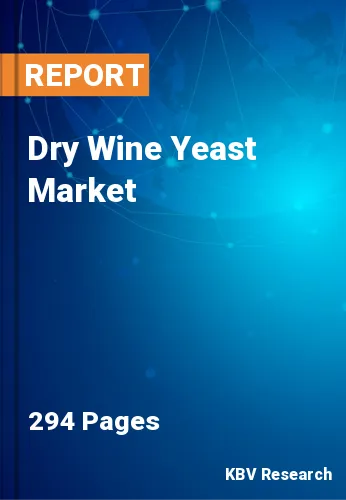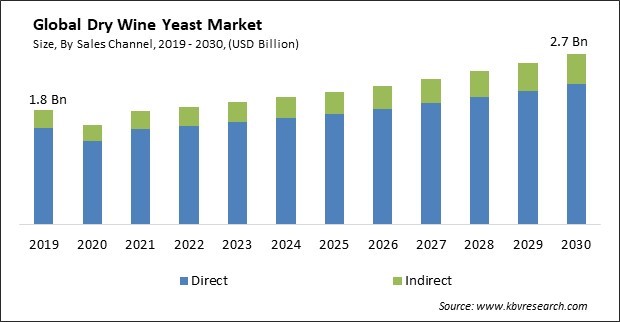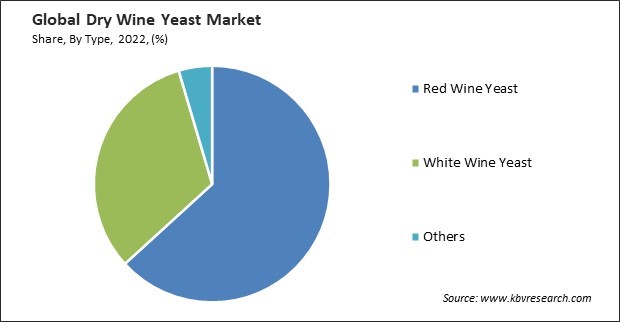
The Global Dry Wine Yeast Market size is expected to reach $2.7 billion by 2030, rising at a market growth of 4.9% CAGR during the forecast period. In the year 2022, the market attained a volume of 5,492.6 Tonnes, experiencing a growth of 2.4% (2019-2022).
E-commerce platforms provide consumers the convenience of browsing and purchasing wines from the comfort of their homes or via mobile devices. This convenience particularly appeals to busy individuals needing more time to visit physical wine stores or wineries. Consequently, the Direct sales segment would register 3/4th share in the market by 2030. This direct sales channel offers the advantage of direct communication, fostering strong relationships between manufacturers and customers. It also allows for better control over product information, pricing strategies, promotions, and customer service, ultimately leading to a more personalized and efficient buying experience for consumers in the market. Online wine retailers often offer a broader selection of wines than brick-and-mortar stores. Consumers can access a diverse range of wines from various regions and wineries worldwide, allowing them to explore different styles and varietals. Some of the factors impacting the market are growth of wine as a beverage around the world, rising wine brewing culture in emerging nations and regulatory and compliance issues.

Global consumption of wine is on a steady rise, and this trend can be due to a confluence of factors that reflect the evolving landscape of consumer preferences and the growing prominence of wine culture worldwide. One significant driver of this consumption surge is the changing preferences of consumers. People are increasingly seeking diverse and sophisticated beverage options, and wine, with its vast array of varietals and flavors, is an appealing choice. This shift toward wine is influenced by its versatility, suitability for various occasions, and its association with elegance and refinement. All these factors will pose a lucrative prospect for the market in the future. Additionally, the globalization of the wine industry has made it easier for emerging nations to access a wide variety of wines from established wine-producing regions. Imports of wine have surged, and consumers are exposed to different wine styles, grape varieties, and winemaking techniques worldwide. The exchange of culture and culinary traditions between nations has contributed to the growth of wine appreciation. As people become more exposed to international cuisines and dining experiences, wine becomes an integral part of these culinary journeys. Wine complements a wide range of foods and enhances dining experiences, which is increasingly recognized in emerging markets. As a result, these factors will propel the expansion of the market.
However, Wine production and distribution are subject to a complex web of regulations that can vary widely from one country or region to another. Compliance with these regulations, which cover labeling, alcohol content, health claims, and more, can be cumbersome and expensive. Accurate and compliant labeling is essential in the wine industry. Regulations often dictate what information must appear on wine labels, including details about the winemaker, origin, grape variety, and alcohol content. Ensuring compliance with these regulations might take a lot of time and money. Owing to these factors, there can be a decreased demand in the coming years.
By end user, the market is bifurcated into residential and commercial. In 2022, the residential segment held a significant revenue share in the market. The residential segment's demand for dry wine yeast is driven by the desire to produce wines with specific flavor profiles and characteristics. Home winemakers often experiment with various yeast strains to create unique and personalized wines tailored to their preferences, further fueling the need for a diverse range of yeast options. Additionally, the rise of wine appreciation and education has encouraged individuals to explore the intricacies of winemaking. This has increased awareness of yeast's pivotal role in fermentation and the final wine's quality. These factors will boost the demand in the residential segment in the upcoming years.
Based on type, the market is segmented into red wine yeast, white wine yeast, and others. The red wine yeast segment acquired the maximum revenue share in the market in 2022. Red wine is popular worldwide, and many consumers prefer red wine varieties. As consumer tastes change and become more sophisticated, there is a rise in demand for a diverse range of red wines with distinct flavor profiles. Different yeast strains can significantly influence the aroma, flavor, and mouthfeel of red wines, making the selection of the correct yeast strain crucial for winemakers. Yeast manufacturers have developed specialized yeast strains specifically designed for red wine production. These strains can enhance red wines' color stability, tannin structure, and aromatic complexity. Winemakers increasingly use these strains to achieve desired characteristics in their red wines. Owing to these factors, the red wine yeast segment is expected to expand rapidly.

On the basis of sales channel, the market is divided into direct and indirect. In 2022, the direct segment procured the largest revenue share in the market. The direct segment primarily consists of yeast manufacturers and suppliers who directly provide dry wine yeast strains to wineries, wine production facilities, and other customers in the industry. This direct distribution model enables these companies to maintain strong, long-term relationships with their clients, ensuring a steady and substantial demand for their yeast products.
| Report Attribute | Details |
|---|---|
| Market size value in 2022 | USD 1.8 Billion |
| Market size forecast in 2030 | USD 2.7 Billion |
| Base Year | 2022 |
| Historical Period | 2019 to 2021 |
| Forecast Period | 2023 to 2030 |
| Revenue Growth Rate | CAGR of 4.9% from 2023 to 2030 |
| Number of Pages | 294 |
| Number of Table | 650 |
| Quantitative Data | Volume in Tonnes, revenue in USD Million, and CAGR from 2019 to 2030 |
| Report coverage | Market Trends, Revenue Estimation and Forecast, Segmentation Analysis, Regional and Countrxy Breakdown, Companies Strategic Developments, Company Profiling |
| Segments covered | Type, Sales Channel, End User, Region |
| Country scope | US, Canada, Mexico, Germany, UK, France, Russia, Spain, Italy, China, Japan, India, South Korea, Australia, Malaysia, Brazil, Argentina, UAE, Egypt, South Africa, Nigeria |
| Growth Drivers |
|
| Restraints |
|
Based on region, the market is segmented into North America, Europe, Asia Pacific, and LAMEA. In 2022, the Europe segment held the maximum revenue share in the market. Europe has a long and storied history of winemaking, with a rich tradition of producing diverse and high-quality wines, and this heritage continues to shape the region's significant role in the market. Europe boasts a wide range of wine-producing countries with unique terroir, grape varieties, and winemaking traditions. This diversity creates a robust demand for various dry wine yeast strains tailored to specific regional and varietal needs. Europe's wineries often require a comprehensive selection of yeast options, from those that enhance the fruity and floral notes of white wines to strains that emphasize the complexity of red wines. Owing to these factors, the Europe segment will proliferate in the future.
Free Valuable Insights: Global Dry Wine Yeast Market size to reach USD 2.7 Billion by 2030
The market research report covers the analysis of key stake holders of the market. Key companies profiled in the report include Lesaffre Group, White Labs Inc., Archer Daniels Midland Company, AEB S.p.A., AngelYeast Co., Ltd., Chr. Hansen Holding A/S, Esseco Srl (Enartis), Lallemand, Inc., LAFFORT, Associated British Foods PLC (Wittington Investments Limited)
By Sales Channel (Volume, Tonnes, USD Million, 2019-2030)
By End User (Volume, Tonnes, USD Million, 2019-2030)
By Type (Volume, Tonnes, USD Million, 2019-2030)
By Geography (Volume, Tonnes, USD Million, 2019-2030)
This Market size is expected to reach $2.7 billion by 2030.
Growth of wine as a beverage around the world are driving the Market in coming years, however, Regulatory and compliance issues restraints the growth of the Market.
Lesaffre Group, White Labs Inc., Archer Daniels Midland Company, AEB S.p.A., AngelYeast Co., Ltd., Chr. Hansen Holding A/S, Esseco Srl (Enartis), Lallemand, Inc., LAFFORT, Associated British Foods PLC (Wittington Investments Limited)
In the year 2022, the market attained a volume of 5,492.6 Tonnes, experiencing a growth of 2.4% (2019-2022).
The Commercial segment is generating the highest revenue in the Market by End User in 2022; thereby, achieving a market value of $2.2 billion by 2030.
The Europe region dominated the Market by Region in 2022, and would continue to be a dominant market till 2030; thereby, achieving a market value of $1.4 billion by 2030.
Our team of dedicated experts can provide you with attractive expansion opportunities for your business.
